Affiliate Disclaimer
Some links in this article are affiliate links. We may earn a small commission if you make a purchase through these links, at no extra cost to you. We only recommend products we find useful to our readersGetting a good night’s sleep can be a struggle, with stress, anxiety, and everyday distractions keeping us awake. While some people rely on white noise or guided meditations, another sound-based solution is gaining popularity: binaural beats for sleep. But do they work? Can listening to specific sound frequencies calm you and help you sleep better?
Let’s explore the science of binaural beats and whether they’re worth incorporating into your bedtime routine.
Read More: Top EMF-Blocking Devices for Better Sleep & Reduced Radiation Exposure
What Are Binaural Beats?
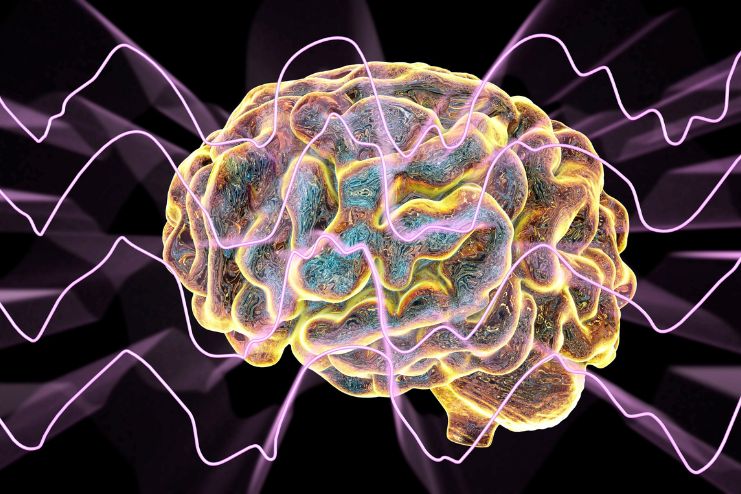
Binaural beats arise when you hear two frequencies that are slightly different in each ear, and your brain hears a third “phantom” beat. For instance, if one ear receives a 300 Hz tone while the other receives 310 Hz, your brain hears a rhythmic beat at 10 Hz— this is the difference between the two tones.
This phenomenon can affect brainwave activity, inducing a change in your state of mind. To experience binaural beats, wear stereo headphones to ensure each ear receives the correct frequency.
How Binaural Beats Affect the Brain & Sleep
Binaural beats are thought to act by producing brainwave entrainment, or they can entrain your brain’s electrical activity with the beats. Various states of mind have different frequencies:
- Delta Waves (0.5–4 Hz): Delta waves help you relax and induce deep sleep. This is the best range for deep sleep.
- Theta Waves (4–7 Hz): Theta waves are linked to light sleep, deep meditation, and enhanced creativity. These are frequently used in meditative states and to induce lucid dreaming.
- Alpha Waves (8–14 Hz): If you wish to relax, especially in the pre-sleeping stage, alpha waves are a good option. These assist in reducing stress and anxiety before sleep.
By listening to the best frequencies for deep sleep (such as delta waves), you may enjoy a better quality of sleep.
Read More: How to Reset Your Circadian Rhythm for Better Energy, Sleep, and Focus
Research Evidence: Do Binaural Beats Improve Sleep?
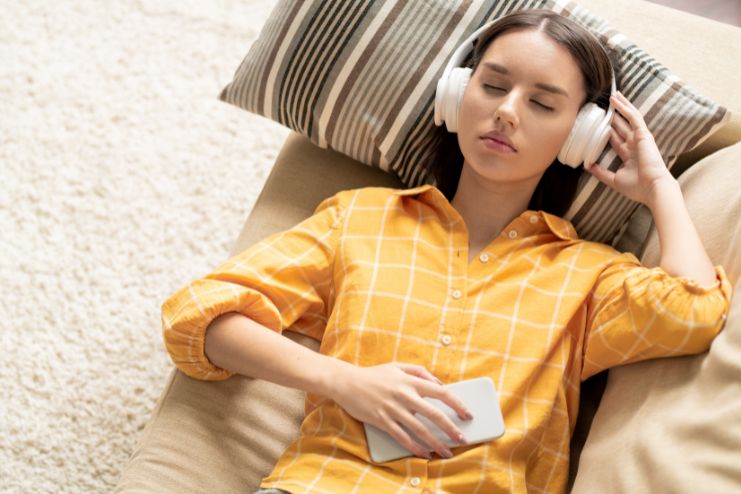
Scientific research on binaural beats for sleep is still evolving. Some studies suggest that these beats can reduce stress and anxiety, making it easier to fall asleep. They have also shown how it improves the quality of sleep, with participants experiencing deeper, more restful sleep.
However, some experts argue that these effects could stem from a placebo response rather than actual brainwave changes.
A case report on ResearchGate studied the impact of binaural beats on relaxation. EEG measurements of participants’ brainwave activity recorded increased alpha wave activity in the frontal regions, indicating a relaxed state.
Also, alterations in the Theta-Beta ratio indicated a calming effect on the brain. The results show that binaural beats can objectively cause relaxation by influencing brainwave patterns.
WebMD points out that binaural beats have been associated with evoking positive feelings. The study suggests that binaural beats, through the frequency-following effect, can synchronize brain activity with relaxation and happiness-linked frequencies. This entrainment process may enhance mood and reduce stress.
A Nature study suggests that home-use brain stimulation, including binaural beats, may be neutral to cognitive processes, and any intellectual improvement may be only a placebo effect.
Read More: Mouth Taping for Sleep: Does It Really Improve Breathing and Sleep Quality?
Benefits of Using Binaural Beats for Sleep
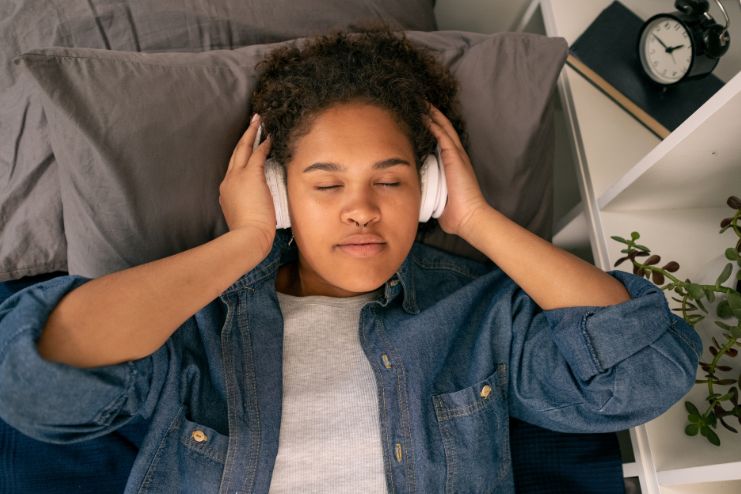
Here’s how binaural beats can change your nighttime routine for the better. Benefits of binaural beats:
- Easier Transition Into Sleep: As mentioned earlier, binaural beats help you fall asleep faster, due to the relaxing effects of brainwave entrainment. These help slow down mental activity and prepare the body for rest.
- Longer Deep Sleep Cycles: You can experience not just faster sleep, but a deep and longer sleep cycle too. As listening to delta waves may improve deep sleep quality, it allows the body to perform essential restorative processes like memory consolidation and muscle repair.
- Reduced Stress and Anxiety: The rhythmic sounds of binaural beats can help lower cortisol levels, promote relaxation, and prepare the mind for sleep.
- Increased Relaxation: Binaural beats are useful as meditation music, helping with a relaxed state of mind and reducing insomnia.
- Fostered Creativity and Positive Moods: Theta and alpha waves are linked to enhanced creativity, problem-solving, and mood elevation—offering benefits beyond sleep.
- Pain Management Support: Some users report relief from chronic pain, migraines, and tension headaches, possibly due to increased endorphin production.
- Improved Concentration and Focus: Although frequencies are primarily utilized for sleeping, some, such as alpha waves, can enhance concentration and mental clarity.
- Reduced Stress: As the brain activity slows down naturally, binaural beats reduce stress hormones, resulting in greater overall mental peace.
- Possible Improvement of Lucid Dreaming: Theta waves, associated with deep meditation, may facilitate vivid dreams and aid lucid dreaming practices.
Read More: 8 Smart Home Devices to Enhance Your Sleep
How to Use Binaural Beats to Sleep Effectively
To get the most out of binaural beats, follow these guidelines:
- Choose the Right Frequency: For deep sleep, use delta waves (0.5–4 Hz).
- Listen for 15–30 Minutes: Include the beats as part of your relaxing routine for a minimum of 15-30 minutes for best results.
- Use Stereo Headphones: Stereo headphones are recommended for binaural beats to work well.
- Experiment with Timing: Some people listen before going to bed, while others keep the beats playing throughout the night.
- Keep Volume Low: The beats should be just loud enough to hear without causing distraction.
- Try Different Sources: You can opt for platforms like Spotify that offer a variety of binaural beat tracks tailored for peaceful sleep.
Potential Downsides & Considerations
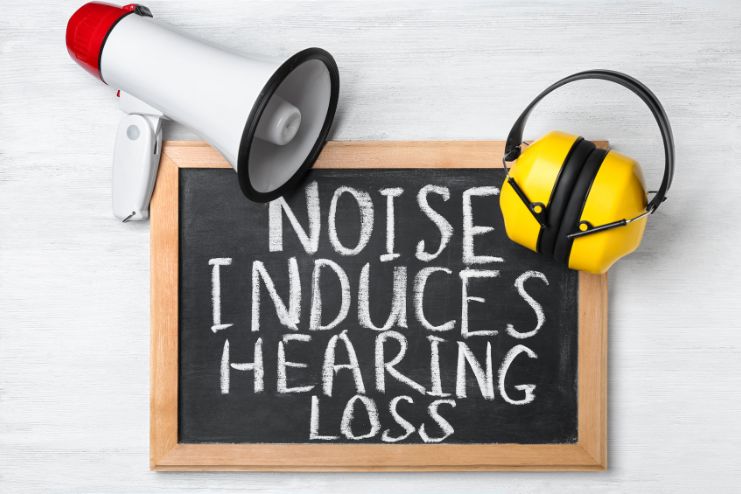
Many people have sworn that the benefits of binaural beats are beneficial to them. However, they may not suit everyone. Here are a few points to keep in mind:
- Some people may not experience noticeable benefits.
- Binaural beats may not be effective if you suffer from hearing loss.
- Certain frequencies may be too stimulating and interfere with sleep.
- Relying on them every night might not be ideal as they may lead to dependency.
- Alternative aids such as white noise, ASMR, or guided meditations can also be equally effective.
Read More: 7 Best Hypoallergenic Pillows for a Healthier Sleep
Conclusion
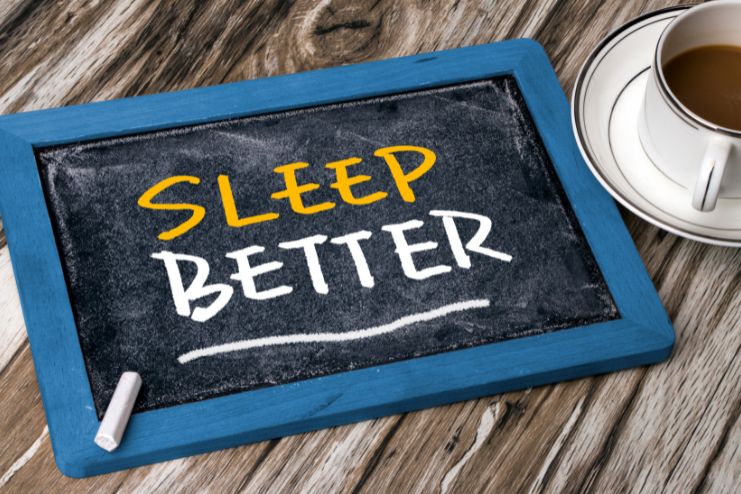
Binaural beats may be a simple, painless method to improve the quality of your sleep. Although studies are ongoing, numerous users find them useful, along with establishing a regular bedtime and limiting the use of screens before sleeping.
If you suffer from insomnia, stressful thoughts, or have difficulties sleeping, binaural beats represent an easy, low-effort form of sound therapy with potentially great benefits.
Put on your headphones, hit play, and find out if binaural beats can help you achieve more restful sleep tonight.
References
- https://www.sleepfoundation.org/noise-and-sleep/binaural-beats
- https://www.sleep.com/sleep-tech/binaural-beats-for-sleep
- https://www.researchgate.net/publication/370579079_Case_report_binaural_beats_music_assessment_experiment
- https://www.webmd.com/balance/what-are-binaural-beats
- https://www.nature.com/articles/s41598-023-38313-4
In this Article




















